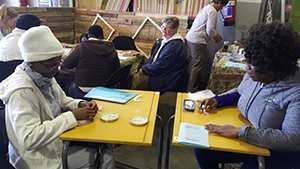Latest News Archive
Please select Category, Year, and then Month to display items
12 January 2024
|
Story Nonsindiswe Qwabe
|
Photo Sonia Small
 Since joining the UFS in 2008, Dr Grey Magaiza has worked extensively on approaches that can foster the socio-economic transformation of societies.
Since joining the UFS in 2008, Dr Grey Magaiza has worked extensively on approaches that can foster the socio-economic transformation of societies.
“The future should be one where communities can decide on their development agenda and futures. That’s the most important for me.” Dr Grey Magaiza, Deputy Director of the Centre for Gender and Africa Studies (CGAS) and Head of the Community Development programme on the Qwaqwa Campus, is passionate about capacitating communities to be agents of change and advancement. His vision for the future emphasises the empowerment of communities to take charge of their development by actively participating in decision making and the implementation of development projects that can improve their lives.
Since joining the UFS in 2008, Dr Magaiza has worked extensively on approaches that can foster the socio-economic transformation of societies. Over the years, he has crafted his research speciality into one that he is most proud of – being an interdisciplinary scientist immersed in the development of communities.
“I’m in a fortunate position of researching what I like. I say ‘fortunate’, because I’ve taken the time to understand what I’m passionate about, which is the overall field of rural livelihoods and livelihood futures – in short, community development. My research starts from an engaged university, understanding the elements that a university must use to enhance transformation and relevance to its immediate community in terms of development.”
One of the ways he has done this is by looking at social entrepreneurship as a development approach for young people in a rural setting. Through workshops with non-profit and civic organisations in Qwaqwa, Dr Magaiza has been helping these organisations to map out their needs and actively meet them through the involvement and support of external role players.
“We understand that communities are part of the national development agenda, but even that national agenda respects community knowledge and intentions and allows communities to shape their identity. A critical enabler of this is community organising. You bring back the capacity in communities to have dialogues on issues affecting them as spaces for engagement, knowledge exchange, and for people to just talk about their way forward.”
By enabling communities to define their development agenda, they can address their specific needs, challenges, and aspirations, he said. “When I look at livelihood futures, it’s quite an exciting aspect of my work – it’s like looking into a fortune tellers’ globe, because you’re not deciding for communities what they should do, but the communities themselves take those decisions.”
Community Engagement Indaba a platform to engage Free State community stakeholders
2016-12-14

Teaching women handicrafts for self-sustainability.
The University of the Free State (UFS), through the office of Community Engagement and in collaboration with Bloemshelter, has hosted the Community Engagement Indaba in Bloemfontein since 2013. This is a platform where stakeholders in business, welfare and other community organisations can network and hold dialogues that can bring about solutions to some of the societal challenges faced by Free State communities.
Bloemshelter is an independent and registered Non-Profit Organisation (NPO) and Public Benefit Organisation that provides shelter for the homeless; catering for women, women with children, the elderly, men and frail persons. The shelter accommodates up to 100 people in both the male and female shelters. The growing partnership it has with the UFS over recent years has grown its ability to reach out to local communities in a more effective way.
At the 2016 Community Engagement Indaba on 25-27 August, a number of stakeholders were invited to participate in the skills development action-learning workshops, under the theme: Unlocking Human Potential and Creating Jobs. This was a platform to strengthen the university’s partnerships with NPOs and other advocacy groups in the province. UFS academics, Community Service Learning students and community partners gave their presentations while the Director of Community Engagement, Bishop Billyboy Ramahlele, offered carpentry training. Among the participating collaborators was the Free State Department of Education, Celebrate Recovery, ABSA Bank, The Shunammite Foundation, Lebone Village, and Global University of Lifelong Learning (GULL).
Those who attended received certificates that will in future help them build a portfolio of learning evidence. The conference was about creating meaning, igniting learning, propelling movement, inspiring hope and encouraging sharing by bringing together students, academics and members of communities. The next Community Engagement Indaba will be held next year, on a date that will be announced early in the year.